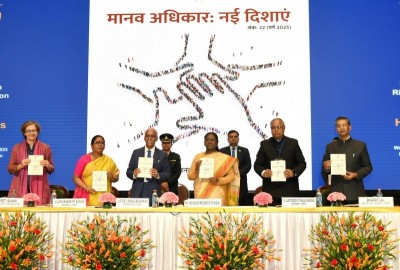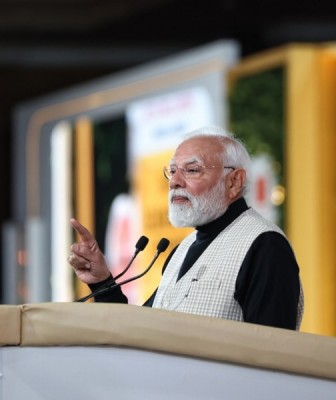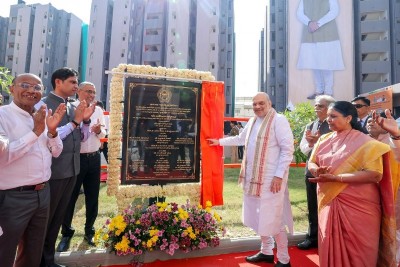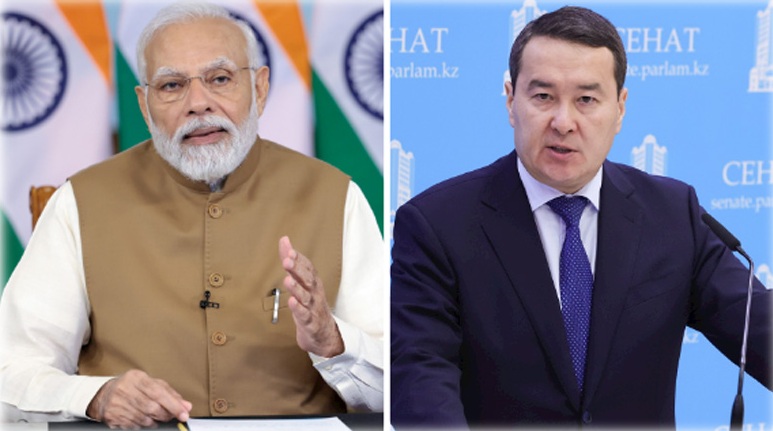 India-Kazakhstan
India-Kazakhstan
India-Kazakhstan relations: A strategic nexus of enduring unity and progressive synergy
The enduring ties between India and Kazakhstan, spanning over two millennia, encompass historical, cultural, and civilizational connections. Evolving since Kazakhstan's independence in 1991, their collaboration intensifies across diverse realms, evident in institutions like the India-Kazakhstan Inter-Governmental Commission.
Engaging on international platforms and addressing shared concerns, the recent India-Central Asia Secretaries/National Security Advisers meeting marked a significant stride. Emphasizing security cooperation, connectivity priorities, and economic integration, the dialogue reaffirmed commitment.
Joint initiatives, including the Joint Working Groups, civil nuclear cooperation, and military exercises like 'KAZIND-2023,' showcase their multifaceted partnership. Economic synergy, cultural exchanges, and educational collaborations further solidify this developmental alliance, reflecting India's strategic approach and Kazakhstan's regional security initiatives.
The upcoming SCO Summit in Astana symbolizes the strong bilateral commitment, anticipating PM Modi's participation, emphasizing the positive outlook for Indo-Kazakh relations.The historical, cultural and civilisational ties between India and Kazakhstan go back over two millennia.
A continuous two-way flow of ideas, cultural influences and trade in goods between the two countries kept flowing between them.
This two-way flow between India and Kazakhstan is best exemplified by the exchange of Buddhism from India to Central Asia and Sufism from Central Asia to India.
India was among the first countries to recognize the independence of Kazakhstan in 1991 following the disintegration of the Soviet Union and subsequent proclamation of independence by Kazakhstan. Since then, there has been an upshot in the relationship on multiple fronts. A formidable bilateral institutional mechanism for developing trade, economic, scientific, technological, industrial and cultural cooperation between the two countries was formulated with India-Kazakhstan Inter-Governmental Commission (IGC) in 1993.
The two countries collaborate and cooperate on multiple international fora including the Shanghai Cooperation Organisation (SCO), Ashgabat Agreement, the International North-South Transport Corridor (INSTC), and other multilateral for a like the United Nations, etc. Since the first India – Central Asia Summit in January 2022, the cooperation between two countries on matters related to not only bilateral but also regional concerns have increased manifold. Aspects such as regional security, connectivity, economic integration, and people-to-people ties have gained immense salience in the bilateral relation.
Against this backdrop, the second meeting of the India-Central Asia Secretaries/National Security Advisers of the Security Councils hosted by Kazakhstan and attended by the security czars of India and the Central Asian States in October 2023 is highly significant.In terms of security measures, both India and Central Asian Republics (CARs) pursue regional stability and face common challenges pertaining to terrorism, extremism and drug trafficking.
Similar to the inaugural meeting, this recent gathering reiterated the shared concerns regarding terrorism, drug trafficking, and organized crime affecting both India and the Central Asian states. Extremism and radicalism persist as significant security threats, capable of generating internal instability through law enforcement challenges in both regions. Indian NSA Ajit Doval reaffirmed India's commitment to aiding the Central Asian nations in fortifying their defence against cyber threats and further deepening the mutual defence and security cooperation.
Connectivity and economic integration based on transparent, participatory, and consultative mechanisms were reiterated as the key priorities by all the parties.
In this regard, Kazakhstan and India urged non-members to join the International North South Transport Corridor (INSTC) and the Ashgabat Agreement that will enable seamless connectivity between India and the Central Asian region, as well as among the Central Asian states themselves. India also invited Kazakhstan and other Central Asian states to utilize the Chabahar port as well as its Shaheed Bahesti terminal.
These countries were also invited to make use of India’s Digital Public Infrastructure, like the UPI, free of cost. Further, Indian NSA also proposed to set up an India-Central Asia Rare Earths Forum to enable India and Central Asian states to jointly explore and extract rare earth and strategic minerals.
India has been appreciative of the initiatives undertaken by Kazakhstan to boost regional security as well as partnership with its neighbouring states, along with friendly countries like India.
Kazakhstan’s initiative to create a network of Regional Centres for Disease Control and Biosafety under the UN auspices as well as a specialised multilateral agency - International Agency for Biological Safety (IABS), highlights the seriousness with which Kazakhstan undertakes the issues of regional security – not only traditional, but also non-traditional security threats.
Moreover, eight Joint Working Groups have been established between India and Kazakhstan to take bilateral relations forward. These Groups are formed in the areas of Trade & Economic Cooperation, Information Technology, Hydrocarbons, Space Cooperation, Textiles, Defence &Military-Technical Cooperation and Counter-Terrorism.
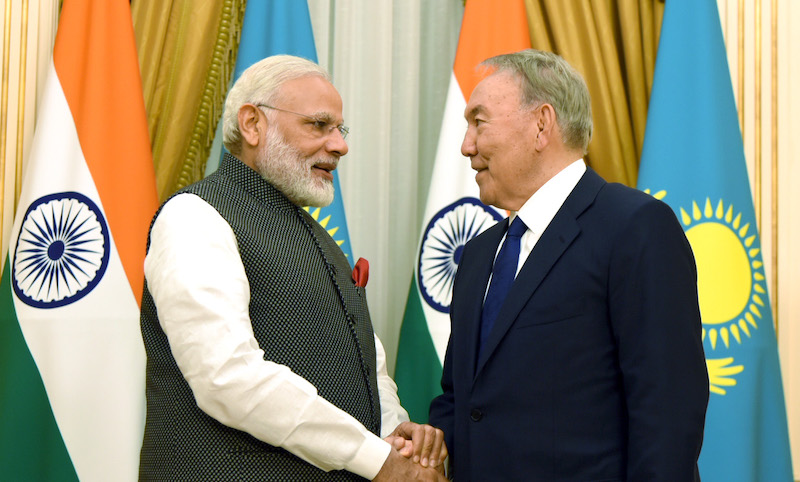 A file photo of Prime Minister Narendra Modi calling on former Kazakhstan President Nursultan Nazarbayev, in Astana, in June 2017. Photo courtesy: PIB
A file photo of Prime Minister Narendra Modi calling on former Kazakhstan President Nursultan Nazarbayev, in Astana, in June 2017. Photo courtesy: PIB
India also has a civil nuclear deal with Kazakhstan to procure uranium for its nuclear power plants. India sources about 80% of its uranium requirement from Kazakhstan. In the realm of defence and security cooperation, Indian companies are in talks with Kazakhstan’s defence industries for the co-development and co-production of defence goods.
The armed forces of two countries also carry out joint military exercise ‘KAZIND’ to enhance interoperability and defence cooperation.
A 120-member Indian Army and Air Force contingent participated in the 7th Joint Military Exercise, 'KAZIND-2023,' held in Otar, Kazakhstan from October 30 to November 11, 2023. Led by a DOGRA Regiment Battalion, the Indian Army comprised 90 personnel, while the Kazakh contingent included forces from the Regional Command South.
The Exercise, evolving from ‘PRABAL DOSTYK’, escalated to a Bi-service event this year, integrating Air Forces. The joint drills focused on counter-terrorism operations, tactical strategies, and combat skills, fostering stronger bilateral military ties.
In the field of space technology, these nations are forging an increasingly robust collaboration. Delving into the prospect of jointly crafting next-generation satellites, both countries are pushing the boundaries of technological advancement.
Within the substantial trade volume of nearly $2 billion that India engages in with the Central Asian region, Kazakhstan spearheads the partnership by contributing a staggering 75%. With trade valued at $1.5 billion, Kazakhstan stands as India's paramount trade ally in the Central Asian domain, solidifying a pivotal economic alliance.
The rising popularity of yoga, Indian films, dance and music in Kazakhstan highlights the growing close cultural and people-to-people ties between India and Kazakhstan. India also provides scholarships in various disciplines under the Indian Council of Cultural Relationship (ICCR) Scholarship programmes for students from Kazakhstan.
Kazakhstan also receives India’s assistance in capacity-building of Kazakhs in various specialized fields under the Indian Technical and Economic Cooperation (ITEC) programme.
India’s partnership with Kazakhstan is based on a developmental model, rooted in cooperation and mutual benefit. India perceives Kazakhstan through the lens of extended neighbourhood policy and aims at collective prosperity.
Through its Connect Central Asia policy, India has a forward-looking orientation for developmental partnership aiming at the geo-economic interests of both countries.Kazakhstan's envoy Zhalgasbayev expresses anticipation for hosting PM Modi at the SCO Summit in Astana next year.
The statement underscores the nation's enthusiasm and readiness, signalling a strong commitment to the bilateral relationship between India and Kazakhstan.
Support Our Journalism
We cannot do without you.. your contribution supports unbiased journalism
IBNS is not driven by any ism- not wokeism, not racism, not skewed secularism, not hyper right-wing or left liberal ideals, nor by any hardline religious beliefs or hyper nationalism. We want to serve you good old objective news, as they are. We do not judge or preach. We let people decide for themselves. We only try to present factual and well-sourced news.





